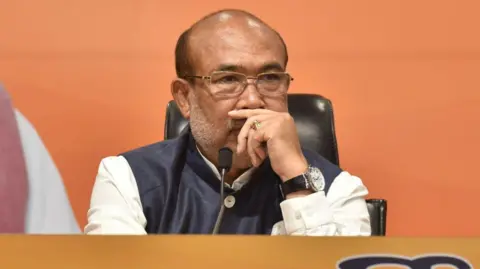Direct rule in violence-hit Indian state after chief minister quits
 Getty Images
Getty ImagesThe Indian government has brought the troubled north-eastern state of Manipur under direct federal rule days after Chief Minister N Biren Singh resigned.
Singh, from India's governing Bharatiya Janata Party (BJP), quit on Sunday after facing months of pressure to step down.
Ethnic clashes broke out between the state's majority Meitei and minority Kuki communities in May 2023 over economic benefits, land rights and job quotas.
More than 250 people have been killed in the conflict and tens of thousands displaced.
The state hit the global headlines in July 2023 when a video showing two women being paraded naked by a mob went viral, sparking outrage in India.
While the scale of unrest has reduced since the peak in 2023, divisions between the communities persist and violent incidents continue to occur.
Singh's position had become increasingly untenable in recent months with Kuki groups accusing him of favouring the Meitei community, of which he is a member - an accusation he denied.
Media reports said there was also rising discontent against him within the BJP.
BJP leaders tried but failed to agree on someone to replace him as chief minister.
On Thursday evening, the office of President Droupadi Murmu announced that federal rule - known as President's rule in India - had been imposed in the state.
"After receiving a report from the governor and after considering the report and other information received by me, I am satisfied that a situation has arisen in which the government of that state cannot be carried on in accordance with the provisions of the Constitution of India," the statement said.
Manipur's last assembly session was held in August and Monday was set to be the first day of the new session, but federally-appointed governor Ajay Bhalla released a statement declaring the session "null and void".
Earlier, opposition Congress party members had said they would bring a no-confidence motion against the chief minister during the session.
Congress leader Jairam Ramesh told the ANI news agency that Singh resigned as he sensed the motion would be passed. Ramesh called for federal Home Minister Amit Shah to resign.
Opposition leaders have also criticised Prime Minister Narendra Modi, who has not visited the state since the violence began.
Meanwhile India's Supreme Court is hearing a plea against Singh filed by a Kuki organisation which accuses him of playing a direct role in fuelling the violence. The petitioners have submitted leaked audio tapes to back up their claims.
The court has sought a forensic report on the tapes before the next hearing. Singh has denied any wrongdoing.
What is the Manipur conflict?
The conflict involves the state's two largest ethnic groups, the majority Meitei and minority Kuki, and their battle over land and influence.
Tensions boiled over in May 2023 when Kukis began protesting against demands from the Meiteis to be given official tribal status. The Kukis argued this would strengthen the Meiteis' already strong influence on government and society, allowing them to buy land or settle in predominantly Kuki areas.
But there are myriad underlying reasons. The Kukis say a war on drugs waged by the Meitei-led government is a screen to uproot their communities.
Since the violence, Manipur has been divided into two camps, with Meiteis inhabiting the Imphal Valley and the Kukis living in the surrounding hill areas. Borders and buffer zones guarded by security forces and community members separate the two regions.
Efforts to hold peace talks between the communities by federal and state officials have so far failed to end the conflict.
